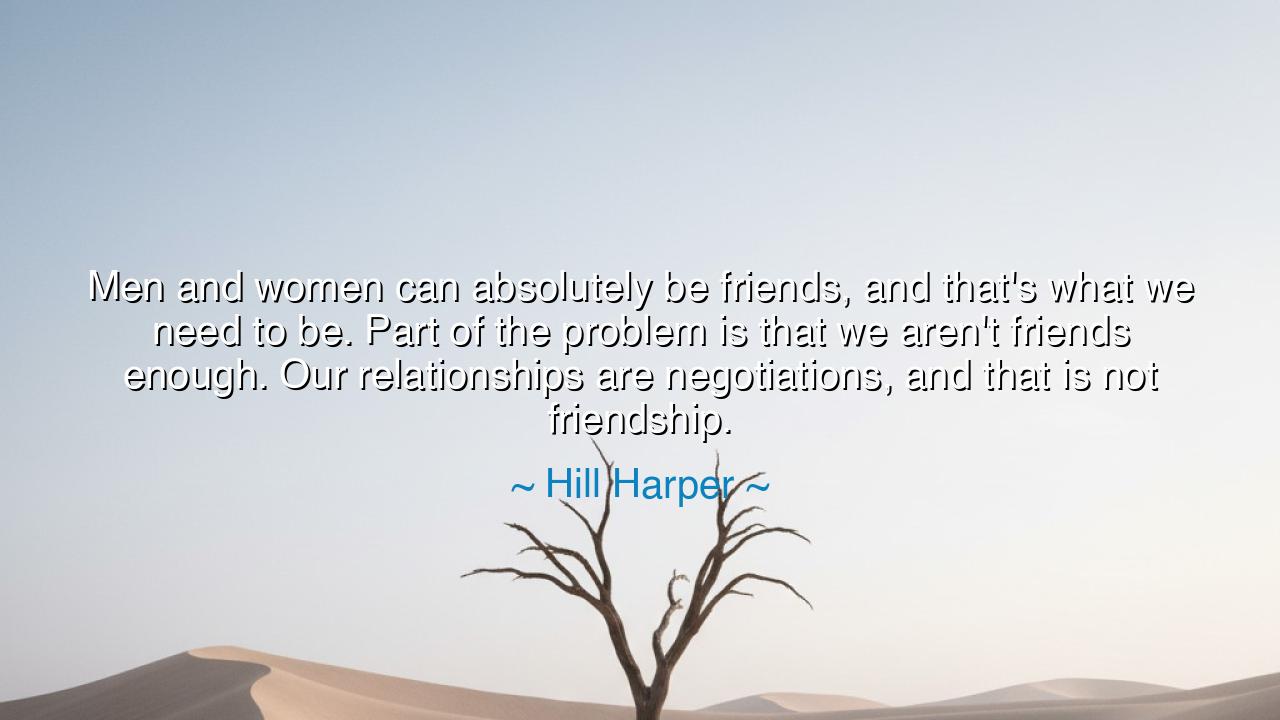
Men and women can absolutely be friends, and that's what we need
Men and women can absolutely be friends, and that's what we need to be. Part of the problem is that we aren't friends enough. Our relationships are negotiations, and that is not friendship.






"Men and women can absolutely be friends, and that's what we need to be. Part of the problem is that we aren't friends enough. Our relationships are negotiations, and that is not friendship." These words from Hill Harper strike at the heart of an ancient truth about the nature of friendship and human connection. In a world where relationships are often defined by transactional motives—by what each person can gain or give in return—Harper reminds us of the purity and depth that genuine friendship should hold. True friendship, he asserts, is not a negotiation, but a bond that exists beyond the need for exchange or personal benefit. This is a vision of friendship that is free from the constraints of bartering, one that is rooted in mutual respect, care, and the desire for shared human connection.
Throughout history, the greatest friendships were those that transcended negotiation and self-interest. Socrates and Plato, for example, shared a bond that was grounded not in material gain or political power, but in a mutual dedication to the pursuit of truth and virtue. Socrates, the great philosopher, did not look to Plato for personal gain but for the growth of his soul. Their friendship was not about what they could extract from each other, but about how they could enlighten one another and, in turn, contribute to the betterment of society. This relationship—rooted in truth, not transaction—was the true essence of what it means to be friends: to be bound by a common pursuit of something greater than oneself.
In the same way, Harper is calling for a return to a more authentic way of relating, one where men and women can interact without the constant underlying tension of expectations and exchanges. In the ancient world, the idea that a man and a woman could be just friends would not have seemed strange. Plato’s Symposium portrays men and women engaged in deep philosophical dialogues, learning from each other, challenging each other, and forming friendships based on shared wisdom, not on negotiation or power dynamics. These relationships were grounded in respect and intellectual engagement, not in the transactional needs that often define our modern world.
The modern world has transformed these ancient ideals, turning relationships between men and women into battlegrounds of expectations, roles, and assumptions. Negotiation becomes the language of interaction: What does one person stand to gain from the other? What are the terms of this relationship? But this is not the language of friendship. True friendship, whether between men and women or among peers of any gender, must be founded on something far more powerful than this. It must be built on the desire to share in each other’s lives, to offer support, compassion, and understanding without the need for compensation.
Consider the friendships of David and Jonathan in the Bible, which were marked not by selfish interests or the need to negotiate, but by loyalty, sacrifice, and unconditional support. Jonathan, the son of King Saul, and David, the future king, formed a bond that transcended familial duty, political ambition, and personal gain. Jonathan helped David escape the wrath of his own father, not out of negotiation or a desire for power, but out of love and loyalty. Their friendship was forged in a time of great political tension, and yet it was based on something far deeper than mere self-interest: a bond that was unconditional and free from the transactional nature that governs many relationships today.
Harper’s words are a reminder that friendship is not about calculating the benefits we can derive from others, but about fostering genuine connection and understanding. When we approach our relationships as negotiations, we strip them of their authenticity, reducing them to mere transactions. Yet when we approach them as friendships, we open the door to deeper emotional and spiritual connections, where the exchange is not about giving and receiving favors, but about the shared experience of life itself.
The lesson here is simple yet profound: friendship should be the foundation of all human relationships, regardless of gender. In our own lives, let us strive to cultivate friendships that are grounded in mutual respect, trust, and unconditional support. Let us move beyond the transactional nature of many modern relationships and focus on the shared joy, challenges, and growth that come from true connection. We must engage in relationships with an open heart, where negotiation is replaced by honesty, and where the beauty of genuine human connection takes precedence over the mere exchange of benefits.
Let us also learn to approach friendship not as a negotiation, but as an opportunity to grow together, to support one another through both triumph and tribulation. Just as Socrates and Plato showed us, true friendship is not about taking; it is about giving, and in doing so, finding the true richness of life. May we remember that friendship is the language of the soul—a language that transcends transactions, that speaks in kindness and loyalty, and that connects us all in the deepest and most meaningful ways.






AAdministratorAdministrator
Welcome, honored guests. Please leave a comment, we will respond soon